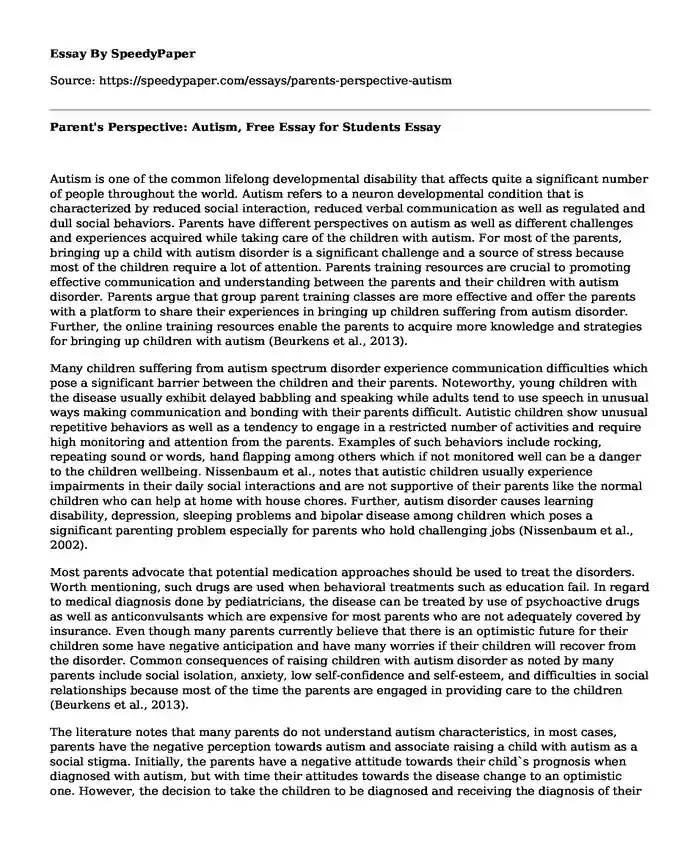Autism is one of the common lifelong developmental disability that affects quite a significant number of people throughout the world. Autism refers to a neuron developmental condition that is characterized by reduced social interaction, reduced verbal communication as well as regulated and dull social behaviors. Parents have different perspectives on autism as well as different challenges and experiences acquired while taking care of the children with autism. For most of the parents, bringing up a child with autism disorder is a significant challenge and a source of stress because most of the children require a lot of attention. Parents training resources are crucial to promoting effective communication and understanding between the parents and their children with autism disorder. Parents argue that group parent training classes are more effective and offer the parents with a platform to share their experiences in bringing up children suffering from autism disorder. Further, the online training resources enable the parents to acquire more knowledge and strategies for bringing up children with autism (Beurkens et al., 2013).
Many children suffering from autism spectrum disorder experience communication difficulties which pose a significant barrier between the children and their parents. Noteworthy, young children with the disease usually exhibit delayed babbling and speaking while adults tend to use speech in unusual ways making communication and bonding with their parents difficult. Autistic children show unusual repetitive behaviors as well as a tendency to engage in a restricted number of activities and require high monitoring and attention from the parents. Examples of such behaviors include rocking, repeating sound or words, hand flapping among others which if not monitored well can be a danger to the children wellbeing. Nissenbaum et al., notes that autistic children usually experience impairments in their daily social interactions and are not supportive of their parents like the normal children who can help at home with house chores. Further, autism disorder causes learning disability, depression, sleeping problems and bipolar disease among children which poses a significant parenting problem especially for parents who hold challenging jobs (Nissenbaum et al., 2002).
Most parents advocate that potential medication approaches should be used to treat the disorders. Worth mentioning, such drugs are used when behavioral treatments such as education fail. In regard to medical diagnosis done by pediatricians, the disease can be treated by use of psychoactive drugs as well as anticonvulsants which are expensive for most parents who are not adequately covered by insurance. Even though many parents currently believe that there is an optimistic future for their children some have negative anticipation and have many worries if their children will recover from the disorder. Common consequences of raising children with autism disorder as noted by many parents include social isolation, anxiety, low self-confidence and self-esteem, and difficulties in social relationships because most of the time the parents are engaged in providing care to the children (Beurkens et al., 2013).
The literature notes that many parents do not understand autism characteristics, in most cases, parents have the negative perception towards autism and associate raising a child with autism as a social stigma. Initially, the parents have a negative attitude towards their child`s prognosis when diagnosed with autism, but with time their attitudes towards the disease change to an optimistic one. However, the decision to take the children to be diagnosed and receiving the diagnosis of their child condition is more challenging because of the heightening of the patient's emotions and fear for the health of their child (Nissenbaum et al., 2002).
References
Beurkens, N. M., Hobson, J. A., & Hobson, R. P. (2013). Autism severity and qualities of parent-child relations. Journal of autism and developmental disorders, 43(1), 168-178.
Nissenbaum, M. S., Tollefson, N., & Reese, R. M. (2002). The interpretative conference: Sharing a diagnosis of autism with families. Focus on Autism and Other Developmental Disabilities, 17(1), 30-43.
Cite this page
Parent's Perspective: Autism, Free Essay for Students. (2022, Mar 23). Retrieved from https://speedypaper.net/essays/parents-perspective-autism
Request Removal
If you are the original author of this essay and no longer wish to have it published on the SpeedyPaper website, please click below to request its removal:
- Dissertation Example on Dabbawala
- Clarity of the Law in Decision-Making Process - Essay Example
- Business Essay Sample: The Decisions Soraya Needs to Make
- Analytic Essay Sample: Correlation between the Psychological Welfare of a Person and His Health
- Free Essay on Fallacies and Argumentation
- Free Essay: Organizational Development, Workforce Planning, and Succession Planning
- Paper Example. Literary Analysis of The Lottery
Popular categories





